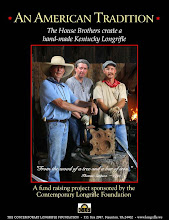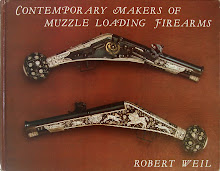To begin, I've been interested in the Kentucky Rifle since
high school, in the early 70's, when I ran into a copy of C. W. Sawyer's book
"Our Rifles". Originally from
northern Ohio, I made many treks to the Log Cabin Shop. They were my first
personal introduction to muzzleloading & the rifles themselves.
After completing a mechanical engineering degree at Fenn
College, I moved to French River, Minnesota in 1985 & built a colonial
home, complete w/ period furnishings.
Then I turned my attention to my first passion, Kentuckies, constructing
3 such rifles between 1993 & 1999.
To date, I've completed 14 Kentuckies & 1 Northwest Trade Gun, all
intended for sale. Legally, I'm French
River Muzzleloaders, LLC.
I consider myself a beginner with much to learn. Currently any engraving on my guns is done by
Micheal C. Hayes or Bruce Lepage. I'll
be taking an engraving class at Conner Prairie this fall & hopefully then I
can execute the simpler folk art motifs, as a minimum. Also, this July, a chip carving class at
Davis & Elkins College in W. Virginia will allow me to begin using that
technique.
I've come to focus presently on Lehigh & (what I term)
Susquehanna guns. (I believe many people
refer to the latter as Sunbury guns & perhaps I should also.)
In the near future I'll be offering a York rifle closely patterned
after one by Jacob Ernst & pictured in H. Kaufman's "The
Pennsylvania/Kentucky Rifle"(plates 129 and 184). This
Ernst gun is as perfectly proportioned as any formal York example I've
seen.
Thus far, I've made my guns using pre-carved stocks from
patterns of my own manufacture. The
Ernst gun will also use this approach but its pattern will be very close to the
intended final shape. My Lehigh &
Susquehanna patterns are left sufficiently bulbous to allow for interpretation
on a gun-by-gun basis.
I further intend to make earlier Lehigh guns as my skills
improve. Doubtless they & my usual
later rifles will, at times, be done form a blank.
After the introduction in the early 80's of Dr. Shumway's
excellent references I developed a fondness for Federal Period Kentuckies. This ended after approximately a decade when I returned to
favor specific later rifles; J. Kuntz, N. Hawk, H. Albright, S Miller.
Late-Golden Age Kentuckies have regrettably earned much of
the artistic criticism leveled at them; they seem to exemplify the habit of
many creative fields which hit a pinnacle & then degenerate. 'Tis sad.
However I'm convinced that a few makers persisted, as named above
(though there were others), and they achieved a degree of design perfection
that at least equaled earlier work. The
Lehigh & Susquehanna/ Sunbury schools, ca 1810-1830, have an undeniable
potential for artistic achievement clearly evidenced in surviving examples.
As stated on my website I try to make authentic rifles while
retaining the same level of design freedom as open to the original makers. In point of fact, this goal of authenticity
is not met to my satisfaction on the Lehigh end, but I'm getting closer. My last two schimmel guns, one still in the
works, are good interpretations of J.
Kuntz, w/ a mix of other true Lehigh features.
But my Susq/Sun guns are true to form & period correct, I'm happy to
report.
Some of my Lehigh guns tend to have a lot of drop in the
butt, averaging 4". In this way
they are like many original late-period Kentuckies; 45 caliber or under, light
recoil, the butt resting just outboard of the shoulder joint, the head held
more erect. (This combination of gun
shape/shooting position persisted into the cartridge period with the off-hand
Ballard, Stevens & Maynard guns, etc.
The cheekpiece becomes more of a chin piece, especially if the tang
sight is set for long range. I like the
feel & flavor of shooting in this manner - the way many fine marksmen did
in a bygone era. I'm something of a
Maynard-aholic anyway.)
Through time I will further introduce some Lehigh pistols,
again after Kuntz, & though it's out of the scope of Kentucky Rifledom, a
range of percussion arms which will include an underhammer design. There will also be some Kentuckies made with
old locks &/or barrels, as these components come into my sphere. I intend to continue at this activity long
enough to do all these things, & more, many times over.
Flintlock Magazine 2002 Volume 5 Number 1.
































No comments:
Post a Comment
Note: Only a member of this blog may post a comment.